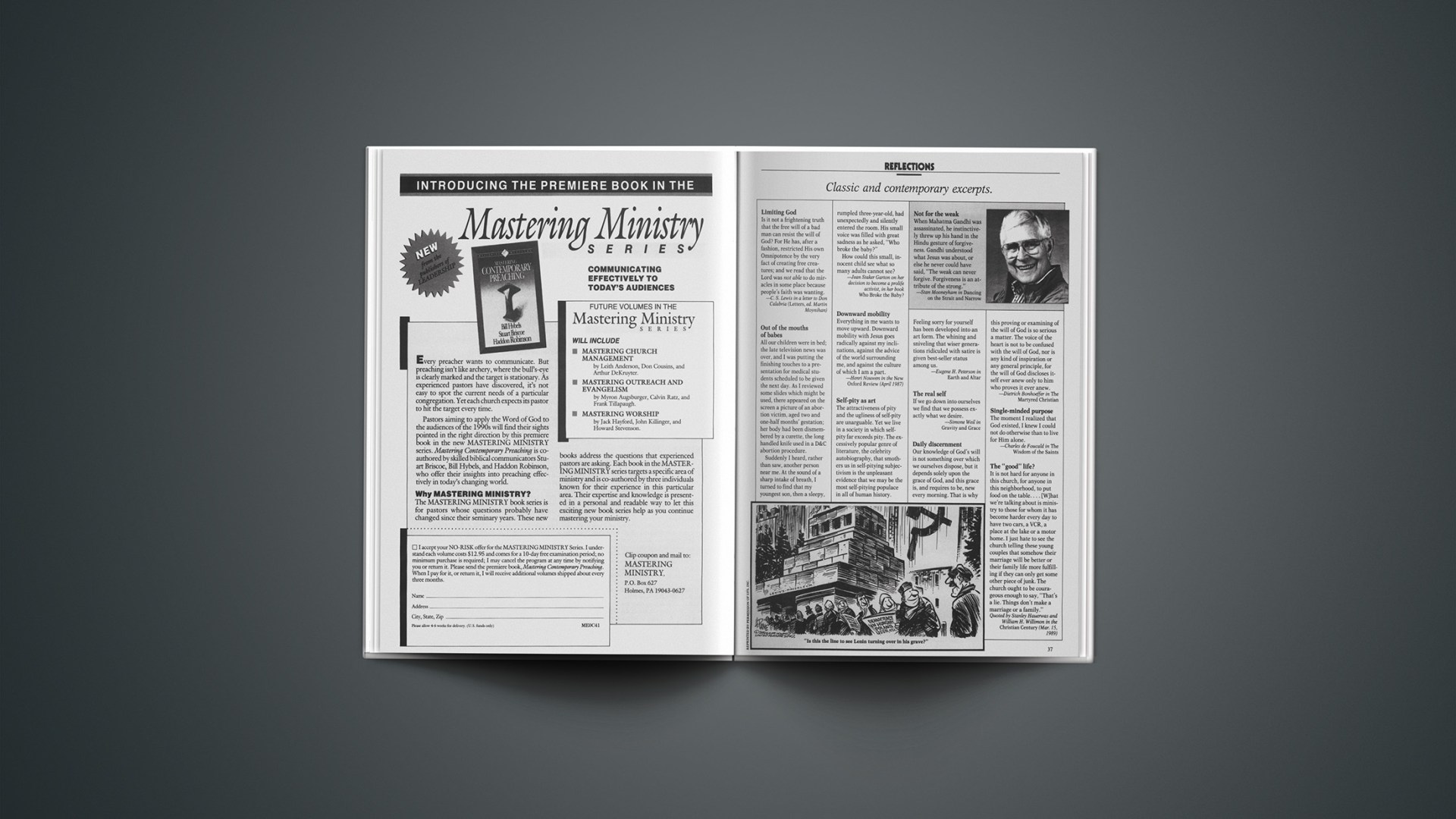Classic and contemporary excerpts.
Limiting God
Is it not a frightening truth that the free will of a bad man can resist the will of God? For He has, after a fashion, restricted His own Omnipotence by the very fact of creating free creatures; and we read that the Lord was not able to do miracles in some place because people’s faith was wanting.
—C. S. Lewis in a letter to Don
Calabria (Letters, ed. Martin Moynihan)
Out Of The Mouths Of Babes
All our children were in bed; the late television news was over, and I was putting the finishing touches to a presentation for medical students scheduled to be given the next day. As I reviewed some slides which might be used, there appeared on the screen a picture of an abortion victim, aged two and one-half months’ gestation; her body had been dismembered by a curette, the long handled knife used in a D&C abortion procedure.
Suddenly I heard, rather than saw, another person near me. At the sound of a sharp intake of breath, I turned to find that my youngest son, then a sleepy, rumpled three-year-old, had unexpectedly and silently entered the room. His small voice was filled with great sadness as he asked, “Who broke the baby?”
How could this small, innocent child see what so many adults cannot see?
—Jean Stoker Garton on herdecision to become a prolife activist, in her book
Who Broke the Baby?
Downward Mobility
Everything in me wants to move upward. Downward mobility with Jesus goes radically against my inclinations, against the advice of the world surrounding me, and against the culture of which I am a part.
—Henri Nouwen in the
New Oxford Review (April 1987)
Self-Pity As Art
The attractiveness of pity and the ugliness of self-pity are unarguable. Yet we live in a society in which self-pity far exceeds pity. The excessively popular genre of literature, the celebrity autobiography, that smothers us in self-pitying subjectivism is the unpleasant evidence that we may be the most self-pitying populace in all of human history. Feeling sorry for yourself has been developed into an art form. The whining and sniveling that wiser generations ridiculed with satire is given best-seller status among us.
—Eugene H. Peterson in
Earth and Altar
The Real Self
If we go down into ourselves we find that we possess exactly what we desire.
—Simone Weil in
Gravity and Grace
Daily Discernment
Our knowledge of God’s will is not something over which we ourselves dispose, but it depends solely upon the grace of God, and this grace is, and requires to be, new every morning. That is why this proving or examining of the will of God is so serious a matter. The voice of the heart is not to be confused with the will of God, nor is any kind of inspiration or any general principle, for the will of God discloses itself ever anew only to him who proves it ever anew.
—Dietrich Bonhoeffer in
The Martyred Christian
Single-Minded Purpose
The moment I realized that God existed, I knew I could not do otherwise than to live for Him alone.
—Charles de Foucald in
The Wisdom of the Saints
The “Good” Life?
It is not hard for anyone in this church, for anyone in this neighborhood, to put food on the table.… [W]hat we’re talking about is ministry to those for whom it has become harder every day to have two cars, a VCR, a place at the lake or a motor home. I just hate to see the church telling these young couples that somehow their marriage will be better or their family life more fulfilling if they can only get some other piece of junk. The church ought to be courageous enough to say, “That’s a lie. Things don’t make a marriage or a family.”
Quoted by Stanley Hauerwas and William H. Willimon in the
Christian Century (Mar. 15, 1989)
Not for the weak
When Mahatma Gandhi was assassinated, he instinctively threw up his hand in the Hindu gesture of forgiveness. Gandhi understood what Jesus was about, or else he never could have said, “The weak can never forgive. Forgiveness is an attribute of the strong.”
—Stan Mooneyham in
Dancing on the Strait and Narrow










